The nanoBergen research community presents itself at the great new website created by Christian Totland. 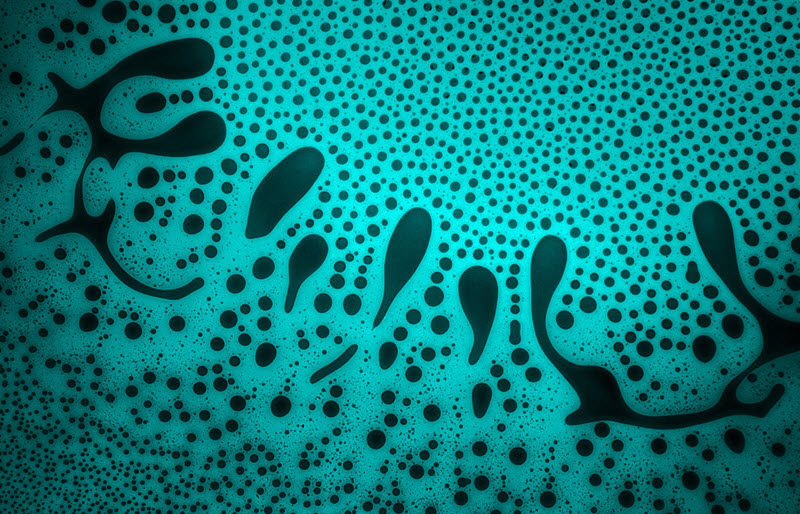 Among the tasty tidbits you will find the winning entry in JEOL’s SEM image contest, entered by Tore Skodvin and Irene Heggstad. Please visit and get inspired by nanoBergen!
Among the tasty tidbits you will find the winning entry in JEOL’s SEM image contest, entered by Tore Skodvin and Irene Heggstad. Please visit and get inspired by nanoBergen!
BTO informerer om at det nå er mulig å søke om FORNY2020 verifiseringsmidler. Forskere med aktuelle prosjekter må ta kontakt med BTO så snart som mulig og innen 8. Mars for innledende prosjektdiskusjoner. Mer info her. Husk også at tirsdag 6. mars er BTO-dag på KI– da er Elisabeth her. Hun vil gjerne diskutere mulige FORNY-søknader!
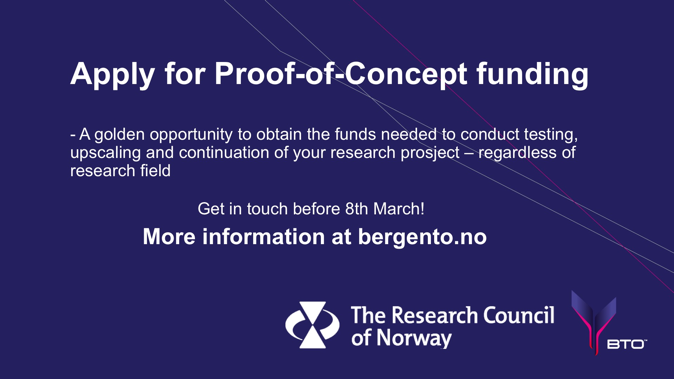
 Today it is one year since the first posting on KjemiNytt.w.uib.no. The total number of posts has reached 122, approaching 3 postings per working week. The number of visitors is not bad but can afford growth.
Today it is one year since the first posting on KjemiNytt.w.uib.no. The total number of posts has reached 122, approaching 3 postings per working week. The number of visitors is not bad but can afford growth. 
Eiendomsavdelingen har koordinert utarbeidelse av en overordnet utviklingsplan for Realfagbygget. Fredag 24. februar presenteres hovedtrekkene i planen for brukere av bygget. Du er velkommen til å delta — møt opp i Auditorium 3 kl 13.00!
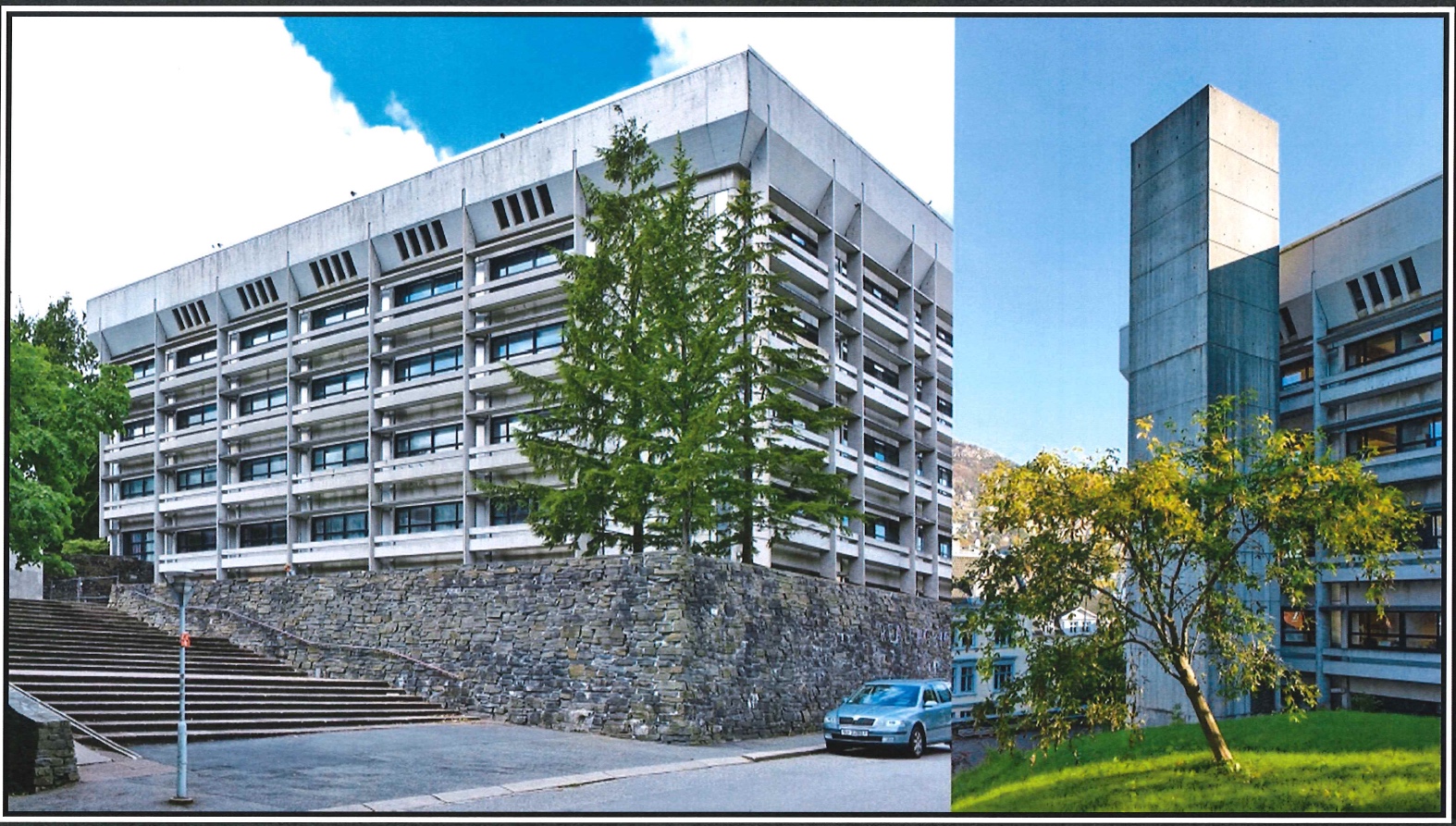
Associate professors in bioinformatics – up to five positions
UiB has established the Computational Biology Unit (CBU) as a centre for research and education within the field of bioinformatics. CBU hosts research groups from multiple linked departments at the faculties of mathematics and natural sciences and medicine and odontology.
With support from the Bergen Research Foundation, CBU will be strengthened with five new group leader positions. The ambition is to boost bioinformatics and computational life science research and education at UiB – through a strong centre with critical mass at the CBU and through tight collaboration with linked UiB departments. The five positions are announced as associate professor («førsteamanuensis») posts, each within one of 5 linked departments one of which is the Department of Chemistry.
For the full ad, see JobbNorge.
The Department of Chemistry (http://www.uib.no/en/kj) is engaged in research on a wide range of topics within basic and applied chemistry and plays a pivotal role in research-based study programs in chemistry, pharmacy, medical technology, nanoscience and -technology, process- and petroleum technology, energy technology, environmental studies, and teacher’s education. The department hosts the Norwegian National NMR Platform and is presently acquiring specialized instrumentation for metabolomics studies.
We seek candidates with a demonstrated preference for molecular and structural concepts and models in their research and a strong track record in cheminformatics, metabolomics or computational chemistry. Documented experience and interests for methods development is an advantage, as is an interest and talent for applying their methods to real-world problems. The successful applicant must show ability and willingness to develop a line of research that interacts constructively with one or several ongoing activities at the Department of Chemistry. The department would in particular like to develop such interactions with activities within design of bioactive molecules and metabolomics studies.
For more information, see www.cbu.uib.noor contact Head of Department, prof. Knut Børve (knut.borve@uib.no, phone +47 55 58 33 65) or Director of CBU, prof. Inge Jonassen (inge.jonassen@uib.no, phone +47 55 58 47 13).
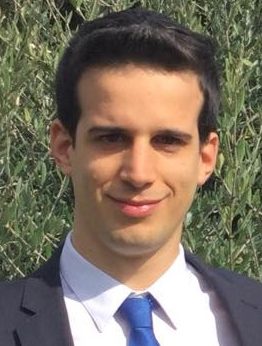
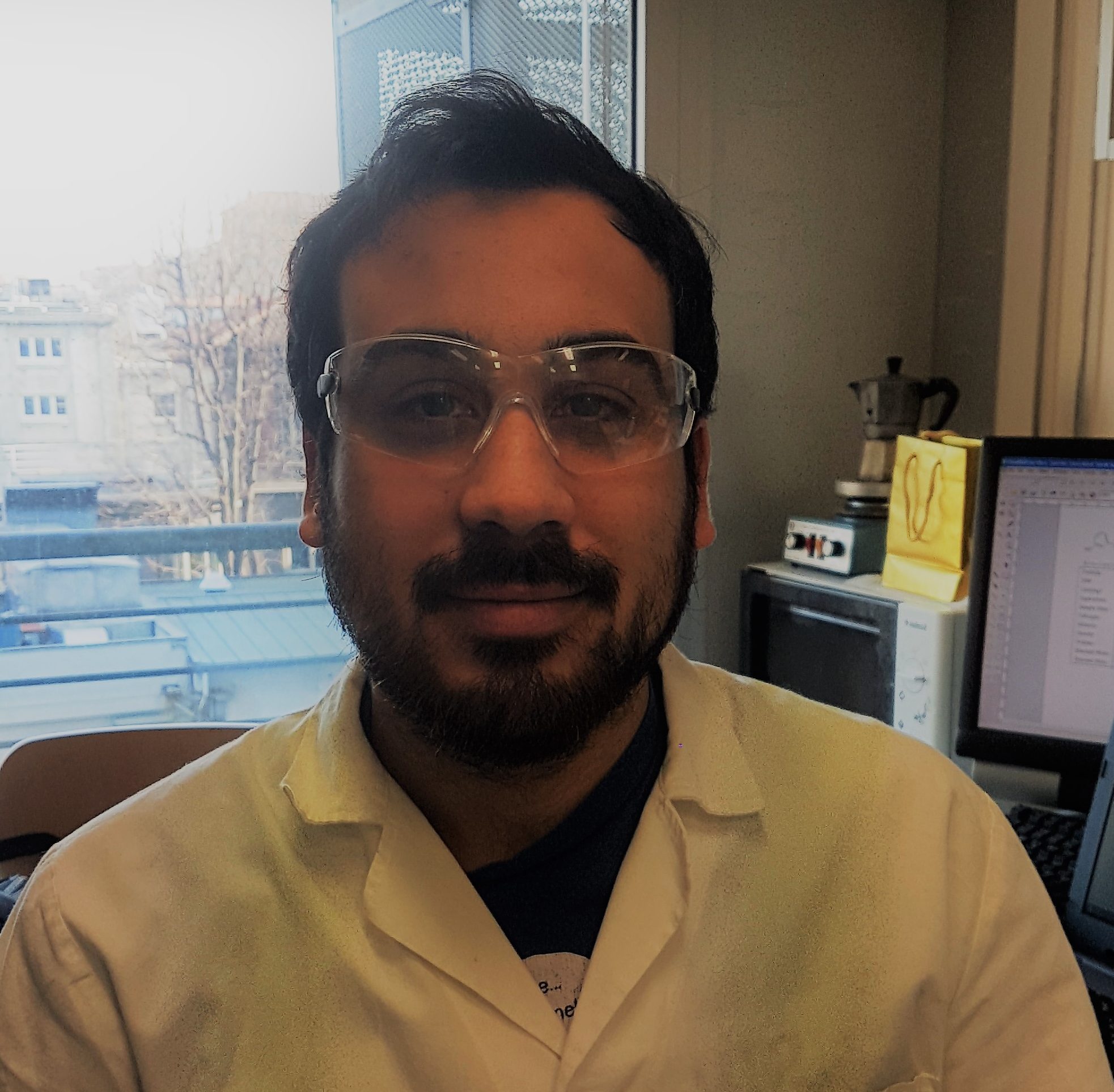 Davide Cirillo and Matteo Faltracco have a lot in common. They have both joined the department very recently as new PhD students working on projects that are parts of PET3D “PET imaging in Drug Design and Development”, funded by European Commision under the H2020 – MSCA–ITN–2015 program (Marie Skłodowska-Curie Action, Innovative Training Network) and are being supervised by Hans-René Bjørsvik. Moreover, they are both Italian and actually were class mates during high school! While both projects are focused on making new PET tracers, Matteo’s is about synthesis and functionalization of small molecules based on 2-nitro imidazole scaffold, whereas Davide aims to synthetize radiolabeled derivatives of Sulfasalazin (an inhibitor of Xc-antiporter).
Davide Cirillo and Matteo Faltracco have a lot in common. They have both joined the department very recently as new PhD students working on projects that are parts of PET3D “PET imaging in Drug Design and Development”, funded by European Commision under the H2020 – MSCA–ITN–2015 program (Marie Skłodowska-Curie Action, Innovative Training Network) and are being supervised by Hans-René Bjørsvik. Moreover, they are both Italian and actually were class mates during high school! While both projects are focused on making new PET tracers, Matteo’s is about synthesis and functionalization of small molecules based on 2-nitro imidazole scaffold, whereas Davide aims to synthetize radiolabeled derivatives of Sulfasalazin (an inhibitor of Xc-antiporter).
Studentbarometeret er oppdatert med 2016-data. For BSc-programmet i kjemi kan vi notere ein fin framgang i dei fleste kategoriar samanlikna med 2014. Eit unnatak er yrkesrelevans, som truleg speglar reduksjonen i petroleumsrelaterte arbeidsplassar. Samanlikna med andre kjemiske bachelorutdanningar, kjem vi ut omlag på gjennomsnittet, bortsett frå for indeksen Inspirasjon. Våre lærarar er tydelegvis meir stimulerande, utfordrande og motiverande enn kjemilærarar flest! Du finn fleire detaljar her.
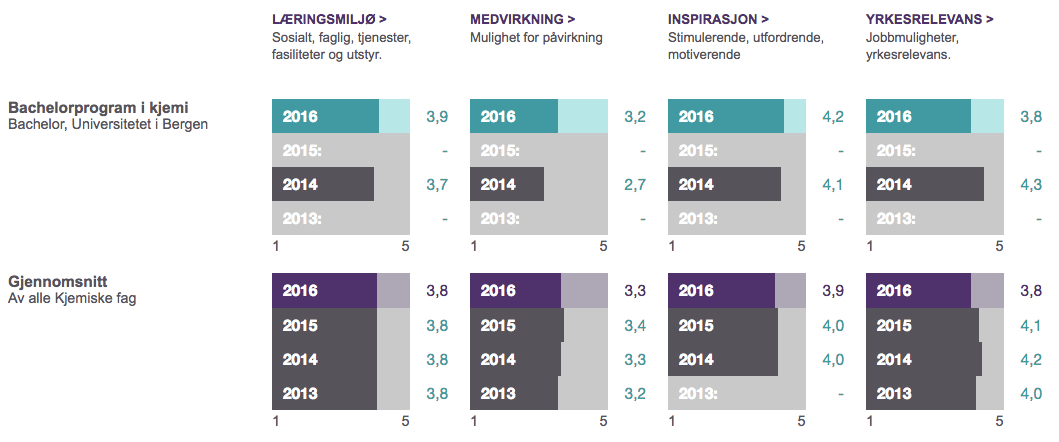
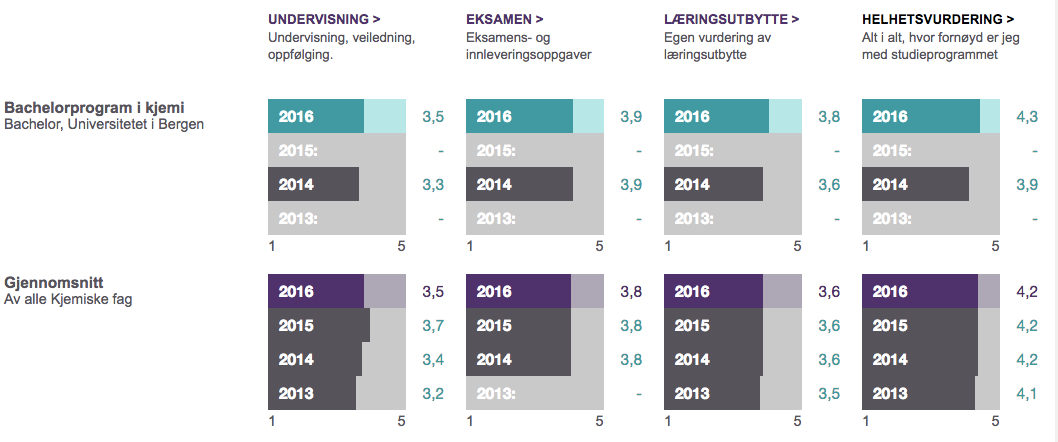
T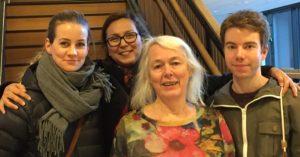 he previously announced half-day seminar on the future of Norwegian biofuel featured a number of interesting talks, with highlights including economical perspectives by Gunnar Eskeland (NHH), the ongoing phasing-in of biofuel in the aviation industry (by the head of Avinor Flesland, Aslak Sverdrup), and research perspectives given by our own Tanja Barth, heavily supported by some of her team members (picture)!
he previously announced half-day seminar on the future of Norwegian biofuel featured a number of interesting talks, with highlights including economical perspectives by Gunnar Eskeland (NHH), the ongoing phasing-in of biofuel in the aviation industry (by the head of Avinor Flesland, Aslak Sverdrup), and research perspectives given by our own Tanja Barth, heavily supported by some of her team members (picture)!
One important take-home message is that Avinor aims to invest 100 MNOK in jet biofuels (2013-2022) and is very much interested in fruitful collaboration with academia and other stakeholders. The work programs for the last leg of Horizon2020 is about to be finalized, with the declaration of intent for renewable fuels for transport and bioenergy made available here. There is large demand for nice chemistry, and our NCP, Tor Ivar Eikaas, states that 60% of the total H2020-funding within this theme is saved for last three years (2018-20).
I forbindelse med revisjonen av studieplaner inviterer MN-fakultetet til workshop på onsdag den 15. februar kl 10.00 – 14.00 på seminarrommet på VilVite.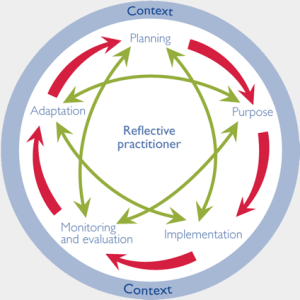
Mange undervisere ved Kjemisk har sendt inn utkast til reviderte læringsutbyttebeskrivelser på sitt eller sine emner i BSc-studiet i kjemi. På denne workshop’en vil du få gode innspill til å videreutvikle utkastet ditt, spesielt med tanke på sammenhengen mellom formulering av faglige mål og egnede former for vurdering av måloppnåelse. Ivar Nordmo og Yael Harlap fra institutt for pedagogikk bidrar med kyndige innspill og nyttige utfordringer.
Påmeldingsfrist er 10. februar. Fakultetet bestiller te/kaffe og lunsj.
Alle kursansvarlige på instituttet er herved oppfordret til å melde seg på workshop’en: Påmeldingsskjema
Små driftsmidler
Det kan nå søkes om små driftsmidler. Instituttet har 370 kkr til fordeling. Midlene skal gå til gode, aktive forskere i fast vitenskapelig stilling som ikke har store driftsmidler allerede. Hver tildeling er minst 15 og maksimalt 75 kkr og skal benyttes innen 1. des.
Ekstra driftsmidler til internprosjekt
Driftsmidler til våre internprosjekt er i hovedsak dekket ved:
- Annuumstildeling (i år: 20 kkr pr UiB-stipendiat)
- Oppstart + belønningsmidler (i år: 15 kkr for kjemi-MSc, 10 kkr for farmasi-MSc, 8 kkr for lektor-MSc (30 stp oppgave), 20 kkr for PhD)
- Små driftsmidler (se over).
- Felles drift med eksternfinansierte prosjekter
For instituttet er det viktig at vi kan tilby MSc-oppgaver innen et bredt spektrum av kjemisk forskning. For å bidra til et driftsgrunnlag for internprosjekter som muliggjør dette, åpnes det for å søke ekstra driftsmidler til MSc- og UiB-PhD-prosjekter. Totalt er det omdisponert 165 kkr til dette formålet for 2017.
Tildeling vil primært bli gitt til MSc-prosjekter hvor det er godtgjort at driftsutgiftene vil klart overgå oppstart + belønningsmidler. Et gitt MSc-prosjekt kan kun gi grunnlag for tildeling i ett kalenderår. MSc-studenten må ha blitt formelt tatt opp til studiet i løpet av 2016. I den grad det er midler igjen etter tildeling basert på MSc-prosjekter, vil det også kunne gis driftstilskudd til UiB-PhD-prosjekter. Det må godtgjøres at driftsutgiftene vil klart overgå annuumstildeling, og PhD-studenten må ha blitt formelt tatt opp til studiet i løpet av 2014-16.
Det kan søkes om både små driftsmidler og ekstra driftsmidler til internprosjekt i samme søknad, men behov og formål må begrunnes separat. Kortfattet søknad (1 side) sendes som vedlegg til epost til vår adm. sjef innen onsdag 15. februar.
 Among the tasty tidbits you will find the winning entry in JEOL’s SEM image contest, entered by Tore Skodvin and Irene Heggstad. Please visit and get inspired by nanoBergen!
Among the tasty tidbits you will find the winning entry in JEOL’s SEM image contest, entered by Tore Skodvin and Irene Heggstad. Please visit and get inspired by nanoBergen!
 Today it is one year since the first posting on KjemiNytt.w.uib.no. The total number of posts has reached 122, approaching 3 postings per working week. The number of visitors is not bad but can afford growth.
Today it is one year since the first posting on KjemiNytt.w.uib.no. The total number of posts has reached 122, approaching 3 postings per working week. The number of visitors is not bad but can afford growth. 


 Davide Cirillo and Matteo Faltracco have a lot in common. They have both joined the department very recently as new PhD students working on projects that are parts of
Davide Cirillo and Matteo Faltracco have a lot in common. They have both joined the department very recently as new PhD students working on projects that are parts of

 he previously announced half-day seminar on the future of Norwegian biofuel featured a number of interesting talks, with highlights including economical perspectives by Gunnar Eskeland (NHH), the ongoing phasing-in of biofuel in the aviation industry (by the head of Avinor Flesland, Aslak Sverdrup), and research perspectives given by our own Tanja Barth, heavily supported by some of her team members (picture)!
he previously announced half-day seminar on the future of Norwegian biofuel featured a number of interesting talks, with highlights including economical perspectives by Gunnar Eskeland (NHH), the ongoing phasing-in of biofuel in the aviation industry (by the head of Avinor Flesland, Aslak Sverdrup), and research perspectives given by our own Tanja Barth, heavily supported by some of her team members (picture)!